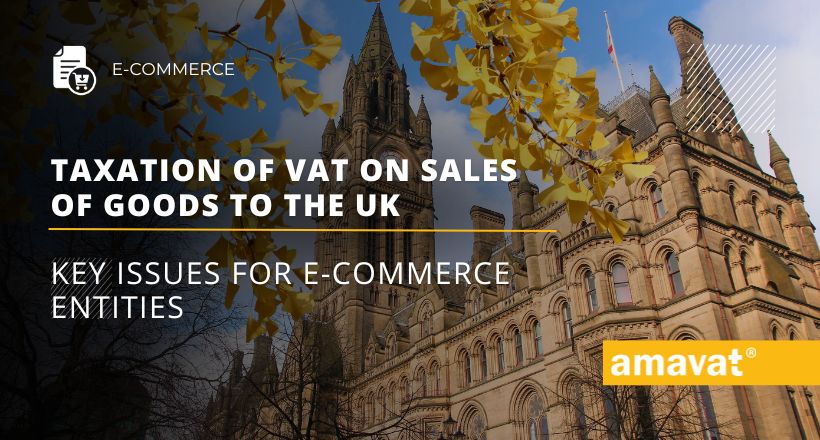Taxation of VAT on sales of goods to the UK
Brexit has caused complications related to the taxation of sales of goods to Great Britain and the settlement of UK VAT. The methods of VAT settlement returns for sales to the UK vary and depend on factors such as transaction value, sales channel, or the status of the e-commerce entity’s recipient. Check how to tax UK VAT on the sale of goods to Great Britain.
Since the beginning of 2021, sales transactions between the European Union and the United Kingdom have been subject to new regulations. These are determined by the Trade and Cooperation Agreement between the UK and the European Union. Post-Brexit, the same rules apply to the United Kingdom as to “third countries” not belonging to the European Union, such as Switzerland, Norway, or the United States.
Sale of goods to the UK by e-commerce entities – basic rules
Since January 2021, there have been exports and imports of goods between the EU and the UK (excluding the territory of Northern Ireland). Therefore, all goods sent to the UK must go through customs clearance. This requires appropriate documents (including an invoice, packing list, or information about the country of origin) and a separate EORI number for the UK, which is a registration and identification number for each entity engaged in international sales.
Export of goods to Great Britain is taxed in Poland at a VAT rate of 0%. However, it is necessary to meet additional conditions, including obtaining confirmation of the customs clearance of exported goods and the mentioned EORI number. In the absence of proper documentation, the VAT rate applicable to the respective type of goods is applied. Regardless of the method of VAT taxation in Poland, an e-commerce entity may be required to pay VAT in the United Kingdom (UK VAT). Settlement of VAT in Poland does not exempt from the obligation to pay VAT in the UK.
Sale to Great Britain through own online store and UK VAT taxation
One option available to e-commerce entities is selling goods to the UK through their own online store. In this case, the entity may be required to register for VAT in the UK regardless of turnover size. Since January 2021, there are no limits on so-called distance selling – every sale subject to taxation in Poland also requires registration and VAT settlement in the UK.
If the buyer is a UK VAT taxpayer, there is no need to register for VAT in the UK – the buyer settles this VAT independently of other conditions. However, if the buyer is an individual, the transaction value must be determined.
If it is equal to or less than £135 (excluding transport costs and other charges), the e-commerce seller must settle VAT in the UK. If the transaction exceeds £135, it constitutes the export of goods – UK VAT and customs duty are also settled by the importer. However, this could be either the seller (if they want to pay VAT on behalf of the customer) or the customer themselves – depending on the agreed transaction terms.
Sale of goods to the UK through selling platforms
Another way to sell goods to the United Kingdom is through transactions conducted via selling platforms – Online Marketplaces (OMP, e.g., Amazon, eBay, Zalando). British regulations impose on selling platforms the obligation to settle UK VAT on behalf of sellers. In particular, OMP is required to settle VAT for shipments from outside the UK worth no more than £135. However, OMP does not collect VAT for transactions where the buyer is another VAT-registered entity in the UK. In such cases, UK VAT must be settled independently.
Warehousing goods in the UK and reclaiming UK VAT
When using OMP, entrepreneurs often opt for a cooperation model called fulfillment (e.g., Amazon FBA), in which the platform handles warehousing, customer service, and parcel delivery. It is important to remember that warehousing goods in the British Isles requires registration for UK VAT with the local tax office. In tax declarations, the revenue obtained from sales (via OMP) of products warehoused in the UK must be indicated.
However, shipping goods to a warehouse in the UK does not trigger the obligation to charge VAT (in Poland). This is because it is not treated as an export but as a transfer of one’s goods from one warehouse to another. However, it is associated with the obligation to undergo import customs clearance.
VAT rates in the UK
There are three VAT rates in the United Kingdom:
- 20% – standard rate;
- 0% – applies to products and services such as printed books, magazines, take-out food, children’s clothing and footwear, construction work on new buildings, domestic waste collection;
- 5% – includes supplies of electricity, medical equipment for disabled persons, LPG, and heating oil for domestic use.
Insurance, financial, postal, educational, medical, hospital, and recreational services are excluded from VAT and UK VAT taxation.
VAT settlement in the UK – quarterly or annually
The standard method of settling UK VAT is to keep detailed records of VAT on all purchases and sales, and then declare it quarterly, submitting it to HMRC and paying the VAT due in England.
UK VAT can also be settled annually, although this is a less common option. In this case, quarterly declarations are not submitted, and there is a yearly reporting and payment deadline for UK VAT. In this model, the e-commerce entity – until the final annual settlement – pays quarterly estimated VAT in the UK.
Selling goods to customers in the UK and UK VAT – use a professional accounting office!
If you run an e-commerce business and want to start selling to the UK or already do so, you can benefit from the support of an accounting office specializing in UK VAT taxation. amavat®, as part of the VAT Compliance service, offers support in registering for VAT in the UK and settling VAT in the United Kingdom, taxing sales to the United Kingdom, preparing appropriate declarations and reports. We will also advise you on whether you really need to pay UK VAT and choose the most advantageous VAT settlement system in the UK for your e-commerce business.
The VAT Compliance service is an essential and very helpful tool for all e-commerce entities. It is not limited to VAT and UK VAT settlement but is a comprehensive set of solutions and tax advice in the e-commerce industry.
More information about the VAT Compliance service and its benefits is available here: https://amavat.eu/vat-compliance-e-commerce/
If you have any questions or need additional information, we encourage you to contact our team of experts, ready to provide help and support: Contact us – amavat ®.






